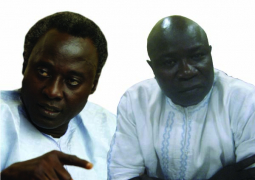The Executive Board of the International Monetary Fund (IMF) Thursday completed the first review of The Gambia’s economic performance under a program supported by the Extended Credit Facility (ECF) arrangement.
The completion of the review enables the disbursement of an amount equivalent to SDR 1.555 million (about US$2.3 million), bringing total disbursements under the arrangement to SDR 10.885 million (about US$16.2 million).
In completing the review, the Board approved the authorities’ request for a waiver for nonobservance of the continuous performance criterion on external arrears and a re-phasing of the reviews.
A statement issued by the IMF Gambia office said Thursday that the Executive Board approved a three-year ECF arrangement with an amount equivalent to SDR 18.66 million (then about US$28.3 million) for The Gambia on May 25, 2012 to support the government’s economic program.
Following the Board’s discussion of The Gambia, Naoyuki Shinohara, Deputy Managing Director and Acting Chair, issued the following statement:
“The Gambian economy is still recovering from the severe drought of 2011. The authorities’ policies and the support of the international donor community played an important role in enabling the recovery in agriculture to take hold. However, downside risks related to the domestic debt burden, weaknesses in the balance of payments, and inflationary pressures, weigh on the outlook. A steadfast commitment to the objectives of the Fund-supported program and structural reforms will be necessary to address the challenges ahead, boost growth, and reduce poverty.
“High public indebtedness continues to pose risks to macroeconomic stability and significant costs to the budget. To address this problem, the authorities plan to sustain the fiscal adjustment and reduce domestic borrowing. Eventually, as interest costs come down, the fiscal savings could help finance priority social programs under the Programme for Accelerated Growth and Employment. Improving debt management is also important.
“The recent introduction of the value-added tax and the planned phasing out of fuel subsidies are welcome steps toward a stronger fiscal position, while also generating resources for better targeted pro-poor spending. Looking ahead, there is further scope to pursue additional tax reforms and enhance the quality of government spending, including by developing a medium-term expenditure framework.
“The Central Bank of The Gambia has tightened its monetary stance to curb inflation risks. This policy adjustment, together with an ample stock of official international reserves, would help bolster the dalasi. A flexible exchange rate regime will continue to facilitate adjustment to balance of payments shocks.
“Domestic economic activity will benefit from additional steps to improve the business climate. Measures should also be taken to improve the quality of economic data in order to enhance policy making and program monitoring.”




